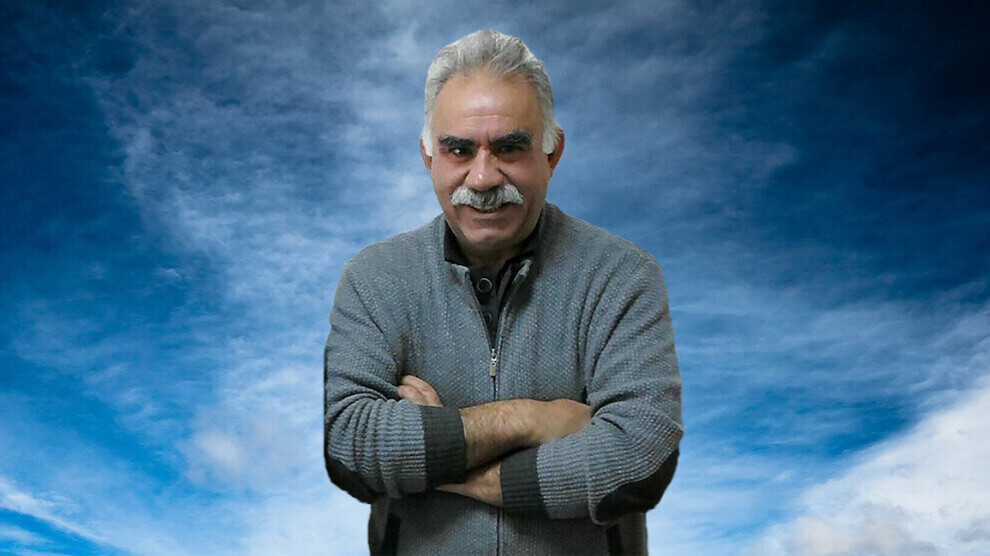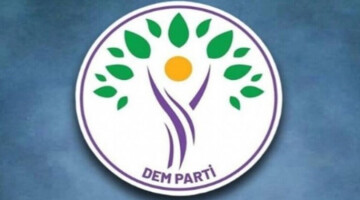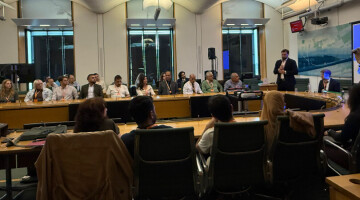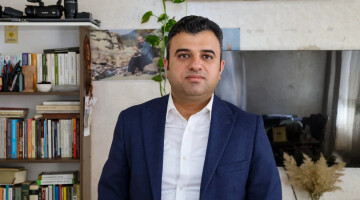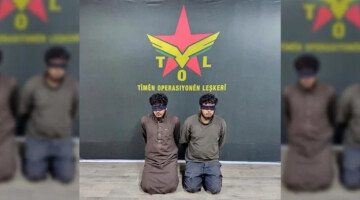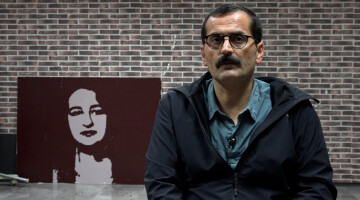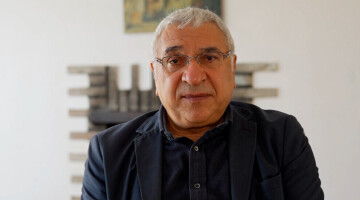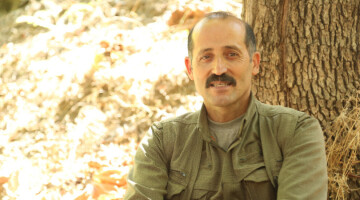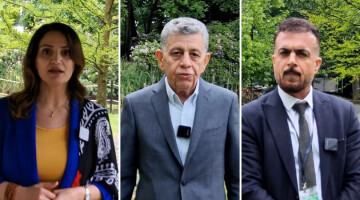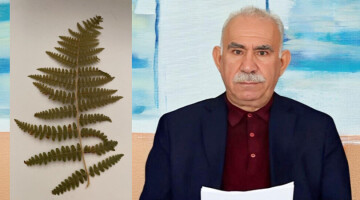The Istanbul-based Asrin Law Office, which represents Abdullah Öcalan and his three fellow prisoners in the maximum security prison Imrali, has released the “2022 Annual Assessment Report on Rights Violations and the Current Conditions in Imrali Island Prison.”
The report released by the Asrın Law Office on Wednesday includes the following:
"İmralı F Type High Security Closed Prison is a single-person island prison that was built specifically for our client Abdullah Öcalan in February 1999 by completely overriding domestic and international law. The prison has since been operated based on a special status and through special practices. Under the so-called aggravated execution regime, which we also refer to as the “İmralı Isolation System”, our clients in the prison have been held under conditions of extraordinary isolation for a long time - 24 years in terms of Mr. Abdullah Öcalan and eight years each in terms of Mr. Hamili Yildirim, Mr. Ömer Hayri Konar, and Mr. Veysi Aktaş.
In İmralı Island Prison, fundamental rights and freedoms have been systematically violated since day one. Our clients’ rights to see their lawyers and family members, to communicate by telephone, and to communicate with the outside world by letter, fax or any other means of communication have been suspended, although these rights are guaranteed by the constitution, international conventions and domestic legislation.
Despite all our attempts, we have not been able to receive even a single sign of life from our clients since 25 March 2021. We could not obtain any information regarding their health status, their detention conditions, their legal situation etc. in 2022. This state of affairs leaves us extremely concerned. It has been 22 months that our clients have not been heard from in any way.
INCOMMUNICADO DETENTION: THE ABSOLUTE IMPOSSIBILITY OF ANY CONTACT WITH OUR CLIENTS
Abdullah Öcalan has been held in a single cell in İmralı Island Prison since 15 February 1999. For the first ten years, he was the only prisoner in the island prison. In November 2009, new cells were added to the prison and five other prisoners were brought in. Nevertheless, Öcalan continued to be kept in solitary confinement 23 hours a day on weekdays and 24 hours a day on weekends.
Until 2011, Öcalan’s right to see his lawyers was limited to one hour one day a week, but in fact, he was constantly prevented from availing himself of this limited right, with the authorities alleging the pretext of “adverse weather conditions” or a “technical defect” of the coaster going to the island. In the twelve years since 27 July 2011, he has only been able to see his lawyer five times, between May and August 2019. The last of these five meetings took place on 7 August 2019.
Since 2014, Mr. Öcalan has received five visits from family members. His brother’s visit to the prison on 3 March 2020 marks Mr. Öcalan’s last direct contact with his family. Also, in 24 years, he communicated with the outside world via telephone on only two occasions (on 27 April 2020 and 25 March 2021). During the last phone call on 25 March 2021, the connection was lost after only two minutes and could not be restored. Mr. Öcalan has not been heard from since.
Hamili Yıldırım has not been allowed to meet with his lawyers even once since he was brought to İmralı Island Prison on 29 March 2015. Over the course of eight years, he was allowed to see his family on only two occasions. His last direct contact with his family occurred on 12 August 2019. He had only two phone calls with his family, on 27 April 2020 and 25 March 2021. He has not been heard from since 25 March 2021.
Ömer Hayri Konar has not been allowed to meet with his lawyers even once since he was brought to İmralı Island Prison on 16/17 March 2015. In eight years, he was allowed to receive visits from his family on only three occasions. His last face-to-face contact with his family occurred on 3 March 2020. Since he was brought to İmralı Island Prison, he was only allowed to communicate with his family by phone on 27 April 2020, when the inmates of İmralı were granted a phone call due to the COVID-19 pandemic. The authorities granted another phone call on 25 March 2021, but the prosecutor’s office informed Mr. Konar’s family that he refused to avail himself of this right because he was protesting his conditions in prison. Mr. Konar has not been heard from since 27 April 2020.
Veysi Aktaş has not been allowed to meet with his lawyers even once since he was brought to İmralı Island Prison on 16/17 March 2015. In eight years, he was allowed to receive visits from his family on only three occasions. His last face-to-face contact with his family occurred on 3 March 2020. Since he was brought to İmralı Island Prison, he was only allowed to communicate with his family by phone on 27 April 2020, when the inmates of İmralı were granted a phone call due to the COVID-19 pandemic. The authorities granted another phone call on 25 March 2021, but the prosecutor’s office informed Mr. Aktaş’s family that he refused to avail himself of this right because he was protesting his conditions in prison. Mr. Aktaş has not been heard from since 27 April 2020.
Our clients’ situation, as summarized above, was described as a form of “incommunicado” detention by the CPT in its report of 5 August 2020 (paras. 48 and 49). The CPT emphasized that such a state of affairs was unacceptable, urging the Turkish authorities to end it as soon as possible. “Incommunicado” detention means that the detainee or convict is completely prevented from any contact with the outside world and therefore cannot communicate with anyone, including his/her family, friends, and lawyers.
This “incommunicado” detention continued without interruption in 2022 despite our weekly applications to the authorities in which we requested for the families and lawyers to be allowed to visit the prison. From 25 March 2021, the last date of contact with our clients, until the end of 2022, a total of 238 applications for lawyer visits and another 79 applications for family/guardian visits were made. These applications were left without any response. Likewise, we did not receive any letters, telegrams, or faxes from our clients during this period; nor was there any contact via phone.
After we applied to different international mechanisms, we learned from the government’s responses that our clients’ right to communicate via phone had been restricted for six months by decisions of the prison’s Management and Supervisory Board dated 18 October 2021, 30 March 2022, 9 May 2022 and 9 June 2022, respectively. These restriction orders were not communicated to the lawyers; the procedures were carried out secretly, bypassing the lawyers. Thus, it was understood that our clients’ right to communicate via phone is subject to periodic restrictions through fabricated decisions that are issued once every six months.
Moreover, we have not received any response to the numerous letters sent to the clients at regular intervals throughout the year. It is not known whether these letters were delivered to their addressees at all. In turn, we have also not received any letters, telegrams or faxes written by our clients in 2022.
In addition, the de facto and unlawful bans on family and lawyer visits that have been in place for many years have been maintained systematically and without cease so that not a single family or lawyer visit could take place in 2022. In this respect, 2022 was marked by the absolute impossibility of establishing any contact with our clients in İmralı Island Prison.
NEW APPLICATIONS AND UNLAWFUL RESTRICTION ORDERS
Article 59 of Law No. 5275 stipulates that detainees and convicts have the right to see their lawyers during working hours, i.e. five days a week. Article 25 of the same law states that convicts subject to the aggravated life imprisonment regime can be visited by their families every 15 days.
In line with these regulations, as in the past, the family members and lawyers regularly submitted written applications to the Bursa Chief Public Prosecutor’s Office, which is in charge of İmralı Island Prison, throughout 2022, requesting permission to visit Mr. Öcalan and the other clients. The same applications were also made to the İmralı Prison Administration through the prosecutor’s office. The total of 49 applications for family visits made to both authorities in 2022 were not responded to in any way. As a result, not a single face-to-face contact between our clients and their family members could take place. This also includes those applications that were filed on the occasion of public holidays. Similarly, the total of 98 applications for lawyer visits made to both authorities throughout the year were left unanswered, with the result that not a single contact between our clients and their lawyers could take place. In addition, all of the 49 applications made every week by Mr. Öcalan’s guardian to the Bursa Chief Public Prosecutor’s Office and the İmrali Prison Administration to obtain permission for a visit to the prison were also left unanswered.
Since 2018, İmralı Prison’s Disciplinary Board has systematically rejected any requests of the families and the guardian to visit our clients in prison on the grounds of disciplinary penalties that “deprive the convicts of their right to receive visitors for a period of three months.” In 2022, family and guardian visits were entirely prevented based on disciplinary penalties imposed on a quarterly basis by the Disciplinary Board of İmralı Prison on 3 February 2022, 31 May 2022, 9 September 2022, and December 2022.
The penalty of depriving detainees and convicts of their right to receive visitors is regulated in Article 43 of Law No. 5275. Paragraph 3 of this article states that “[t]he provision of this article does not apply to visits by official and authorized authorities, lawyers and legal representatives.” Despite this express limitation, the guardian of Mr. Öcalan, who acts as his legal representative, is also prevented from visiting the prison on the grounds of disciplinary penalties.
The disciplinary investigations underlying these disciplinary penalties were carried out secretly by the prison’s Disciplinary Board, without the knowledge of the lawyers. The decisions regarding these penalties were only communicated to our clients, who were cut off from all contact with the outside world. The authorities deliberately waited for the objection period to pass so that these decisions would become final without any action taken against them. Since the lawyers were completely prevented from visiting İmralı Prison and seeing or communicating with their clients, they only learned about these disciplinary penalties when they became effective. Since this has become a systematic practice, we filed applications with the Bursa Chief Public Prosecutor’s Office, the Directorate of İmralı Prison and the Bursa Execution Judge’s Office at the end of each three-month period. As a priority, we requested the authorities to ensure that family visits would take place. In case this does not happen, we further requested to be assigned to any pending disciplinary procedures on the e-judiciary platform UYAP and to be given a copy of the file containing the decision and its grounds, also stating that we objected to any potential disciplinary penalty in order to prevent a loss of time. However, the Execution Judge’s Office ruled to reject all of our requests and objections without presenting any legal basis for its decisions; our objections to these decisions were then rejected by the Bursa Assize Court on the basis of very general and abstract statements and without any reasons adduced.
The lawyers’ persistent attempts to appeal the fabricated disciplinary penalties to the competent legal authorities, which have become virtually blunted at this time, were without success: The Execution Judge’s Office invariably denied the lawyers’ access to these files.
As a result, despite all requests and objections, the lawyers were neither given any copies of the disciplinary files nor were they assigned to these files on the UYAP platform. The proceedings against the clients were hidden from their lawyers and finalized in an illegal manner, with the relevant administrative and judicial authorities, through a joint effort, preventing our clients from obtaining legal assistance.
Similarly, the proceedings leading the Bursa Execution Judge to restrict our clients’ right to see their lawyers for six-month periods were also carried out secretly from the lawyers. We learned about these restriction orders after filing a complaint with the Execution Judge’s Office, requesting the latter to ensure that our clients were allowed to see their lawyers, since this had not been possible despite all applications. In its responses to these complaints, the Execution Judge’s Office stated that there was “a court order in terms of each of the convicts to restrict their right to see their lawyers for a period of six months.” We thus found that the Bursa Execution Judge’s Office had issued two decisions (on 13 April 2022 and 21 October 2022 respectively) which effectively banned lawyer visits for the whole of the year 2022. The appeals against these decisions were rejected on the grounds that the orders in question had already become final after these proceedings had been carried out solely through our clients who were cut off from all contact with the outside world.
Since it was intended to conclude the investigation processes regarding the restriction orders and disciplinary penalties without the lawyers getting involved, even objections that by chance coincided with the objection periods were kept pending and only processed once the decisions against the clients had become final. Completely cut off from the outside world, our clients were thus deprived of the assistance of a lawyer.
Our requests for copies of each of the six-month bans on lawyer visits issued by the Bursa Execution Judge and of the relevant files and for us to be assigned to these files on the UYAP platform were rejected by additional decisions of the Execution Judge’s Office without presenting any legal basis, despite the fact that we submitted a duly signed power of attorney. Our objections to these decisions were then rejected by the Bursa Assize Court on the basis of very general and abstract statements and without adducing any reasons.
Throughout 2022, unlawful “court orders” prevented us from properly fulfilling the requirements of our profession in terms of representing our clients in legal processes. Through the joint efforts of the government and the administrative and judicial authorities, our clients, violated in their fundamental rights and freedoms recognized in the law, constitution, and international conventions, were de facto deprived of their right to defense, fair trial, and access to court and legal assistance.
We filed numerous requests and complaints over the course of the past year to end the ban on lawyer visits, which is part of the overall absolute isolation imposed on our clients, to stop the de facto practices that prevent us from representing our clients in legal processes, to ensure that our clients could exercise their rights arising from national and international legislation, and to urge the authorities to abstain from preventing the lawyers from fulfilling their duties – however, without any success.
The current state of affairs is not the result of the law, but rather of the state’s policy of absolute isolation. This policy reached a new stage especially after April 2015. Free from any judicial review, the prison administration and members of the judiciary acted in violation of their legal duties. For this reason, criminal complaints were filed to the Council of Judges and Prosecutors and the Bursa Chief Public Prosecutor’s Office against all judges and prosecutors within the İmralı Isolation System whose conduct violated the law. This motion has not led to any positive outcomes or developments in 2022, either. On the contrary, our complaints were rejected without even being processed. This is another proof that the extralegal and illegal policy and practice of absolute isolation specific to İmralı Island Prison is carried out in concert by the government and administrative and judicial authorities.
OTHER APPLICATIONS AND DEVELOPMENTS REGARDING THE ISOLATION AND INCOMMUNICADO DETENTION OF OUR CLIENTS
On 24 December 2021, we lodged an application to the Constitutional Court, requesting the court to order an injunction to end the “incommunicado” detention, which gravely violates the prohibition of torture, and to establish the conditions for a meeting with our clients as soon as possible. In its interim decision dated 12 January 2022, the Constitutional Court did not find that the fact that our clients were deprived of all their rights and completely cut off from the outside world constituted a violation and rejected our request for an injunction. Despite the urgency of our application, which concerned the need for an injunction, the interim decision was communicated to us only on 31 January 2022.
After the Constitutional Court unlawfully rejected our application at the beginning of 2022, the incommunicado detention of our clients was maintained without any interruption through decisions issued by the prison administration and local courts.
With the aim of overcoming the illegal restriction orders and establishing contact with our clients, 775 lawyers registered with 29 different bar associations in Turkey applied to the Bursa Chief Public Prosecutor’s Office and İmralı Prison Administration between 10-17 June 2022, requesting lawyer visits to the prison to take place as soon as possible. Hundreds of lawyers, including the presidents of bar associations, were left without any response.
Throughout the year, we were unable to obtain any information regarding our clients’ state of health, conditions of detention, legal status and other similar aspects. The prolonged incommunicado detention that is sustained by the ineffectiveness of all domestic remedies further increased our concerns about our clients’ wellbeing. Therefore, on 29 July 2022, we submitted an application to the United Nations Human Rights Committee and requested an injunction.
A petition by 350 lawyers from 22 (mainly European) countries sent to the Ministry of Justice on 14 September 2022 was followed by another petition by 756 lawyers from the Middle East sent to the ministry on 19 September 2022. In both petitions, the lawyers requested permission to visit our clients in İmralı Island Prison and urged the Turkish authorities to put an end to the ongoing violations. However, these requests were also left unanswered.
On 28 November 2022, an appointment was requested from the Ministry of Justice for a meeting to discuss the need to put an end to our clients’ incommunicado detention, ensuring physical contact with them, and remedying the unlawful conditions of isolation. To date, we have not received any response from the ministry.
Moreover, the CPT’s recommendations towards ending the unlawful practices in İmralı Island Prison, let alone their implementation, were systematically frustrated through unlawful decisions and practices.
In all of its reports from 2013 and onwards, the CPT has repeatedly confirmed that the denial of access to a lawyer was based on a political decision that was also contrary to domestic legislation (see: CPT 2013 report, para.18, and subsequent reports). In paragraph 49 of its 2019 report, the CPT moreover noted that it considered as rather specious the reasons cited for imposing disciplinary penalties on our clients to restrict their family visits. In connection with its findings, the CPT urged the Turkish authorities to ensure that our clients could make effective use of their right to receive visits from family members and see their lawyers. These recommendations could not prompt any change in the attitude of the government, the prison administration, the Prosecutor’s Office, the Execution Judge’s Offices, the Assize Courts, and the Constitutional Court with respect to preventing family and lawyer visits.
In 2022, we submitted three separate communications to the CPT as the competent mechanism for preventing, detecting, and eliminating torture and inhuman and ill-treatment within the borders of the Council of Europe. In these submissions, we laid out in detail how the conditions of detention in İmralı Island Prison exceeded ill-treatment, how those practices within the aggravated life imprisonment regime that violated the prohibition of torture and the prohibition of discrimination were systematically continued, and that we had not received a single sign of life from our clients since 25 March 2021 as they continued to be held in “incommunicado”. For these reasons, we requested the CPT to conduct a de facto visit to İmralı Island Prison in order to observe and examine the situation on site and to launch procedures to take coercive measures that would end the ban on family and lawyer visits and improve the conditions of detention.
The CPT announced that it had visited İmralı Island Prison between 20-29 September 2022 but did not make any statement regarding the condition of our clients. During a face-to-face meeting with the CPT, our questions about the health and conditions of our clients were left unanswered and the CPT refused to provide any tangible information.
In our last communication to the CPT on 31 December 2022, we therefore requested the Committee to make the report on its last visit to Turkey urgently available to the public. This request was based on Article 10/2 of the European Convention for the Prevention of Torture, which reads as follows: “If the Party fails to co-operate or refuses to improve the situation in the light of the Committee’s recommendations, the Committee may decide, after the Party has had an opportunity to make known its views, by a majority of two-thirds of its members to make a public statement on the matter.”
We can find various examples in the history of the CPT where it made such public statements. In the case of İmralı Island Prison, however, the CPT makes the sharing of its observations conditional on the government’s approval.
A new disciplinary penalty restricting family visits was imposed on our clients prior to the CPT’s last visit (20-29 September 2022), on 9 September 2022, and a new six-month ban on lawyer visits was imposed on our clients immediately after this visit, on 21 October 2022. If we also take into account that the recommendations made by the CPT during earlier visits and in previous reports have not translated into any action, we have to conclude that the national bodies do not show any real interest in the CPT’s reports and observations.
Finally, we were reminded once more of the nature of the prison regime when Abit Aktaş, the father of client Veysi Aktaş, passed away on 20 December 2022. We filed an application with the Bursa Chief Public Prosecutor’s Office on the same day, requesting that Veysi Aktaş would be allowed to attend the funeral and the subsequent condolence ritual. Article 66/3 of the Law No. 5275 states that “[i]n the event of death or serious illness of the convict’s direct ancestors or descendants, spouses, and siblings, or in the event of epidemic diseases or natural disasters, he or she shall immediately be allowed to use the institution’s telephone and/or fax device.” According to Article 94 of the same law, entitled compassionate leave, in the event of the death of one of their blood relatives or in-laws, including second degree relatives, or of their spouses, convicts have the right to attend the funeral. However, our client Veysi Aktaş was not allowed to attend the funeral and condolence ritual. Nor was he allowed to communicate with his family by phone or fax, even though this is required by law. Given the circumstances of his detention, we do not in fact know whether he was informed about the death of his father at all. Even in the face of an event so central to human existence, the absolute “incommunicado” detention of our clients was continued without respite.
2022 was thus marked by our clients’ absolute incommunicado detention, which prevented us from receiving a single sign of life from them.
VIOLATIONS
Violation of the Prohibition of Torture and Ill-Treatment
The main purpose of the prohibition of torture and ill-treatment is to protect human dignity and physical and mental integrity under all circumstances. The prohibition of torture is enshrined in the Universal Declaration of Human Rights, the International Covenant on Civil and Political Rights, the European Convention on Human Rights, and many other instruments of international law. In addition to the prohibition of torture, Article 3 of the ECHR also covers inhuman treatment, inhuman punishment, degrading treatment and degrading punishment. As the ECtHR has often reiterated, Article 3 embodies one of the most fundamental values of democratic societies. Member States must therefore respect this provision and take all necessary measures to ensure its effective implementation within their jurisdiction.
As stated in Article 1 of the ECHR, it is a universal fundamental human rights criterion that apart from the deprivation of liberty based on a court decision issued in accordance with the law, every prisoner should be entitled to all rights enjoyed by other individuals. Imprisonment should be carried out in a manner that respects human dignity and does not exceed the minimum limitations that naturally arise from the deprivation of liberty. In the case of Mr. Öcalan and our other clients, these natural limitations have been exceeded for many years. They have been held in absolute isolation and in incommunicado detention, depriving them of all contact with the outside world. The current state of absolute isolation and incommunicado detention violates the prohibition of torture, exposing our clients to torture and inhuman punishment and treatment.
Meanwhile, the aggravated execution regime itself, which is practiced in İmralı Island Prison based on a “legal provision”, violates the prohibition of inhuman treatment. As a matter of fact, in its judgment on Öcalan No:2 of 18 March 2014, the ECtHR ruled that some aspects of the aggravated execution regime violated the prohibition of torture under Article 3 of the ECHR. The Court indicated that the violation had arisen not at the time of the decision, but from the moment the legal provision was introduced. In other words, it has been internationally recognized that the aggravated execution regime of İmralı Island Prison has been a regime of torture from the very beginning.
Violation of the Right to Correspondence
The right to demand respect for the right to correspondence, as well as for private and family life, is protected in Article 25 of Law No. 5275, Article 22 of the Turkish Constitution, Article 8 of the ECHR, and several international conventions to which Turkey is a party. The right to communication encompasses the right for each individual to approach others in order to establish and develop relationships with them and with the outside world, that is, the right to a “private social life”. This includes a person’s physical, psychological or moral integrity, his privacy and his identity and autonomy. The guarantee afforded by Article 8 is primarily intended to ensure the development, without outside interference, of the personality of each individual in his relations with other human beings. It is an essential part of a prisoner’s right to respect for family life and correspondence that the prison authorities assist him or her in maintaining contact with his or her close family and lawyers. Our clients, by contrast, were deprived of the right to receive visitors and denied the right to communicate by phone, letter, and fax throughout 2022.
Violation of the Right to a Fair Trial
Within the scope of the right to a fair trial, our clients continue to enjoy the right to defense throughout the duration of their imprisonment. Besides being deprived of their personal liberty, prisoners enjoy the same rights as other individuals. In this respect, in line with Article 6/1 of the ECHR, there are vital legal and social aspects to the right to access to a lawyer.
Mr. Öcalan and our other clients have numerous cases pending before the Constitutional Court and the European Court of Human Rights. As already explained in the relevant sections of this report, they face disciplinary proceedings every three months, at the end of which they invariably receive the same disciplinary penalties. Usually, they should have the right to seek the help of a lawyer and legal assistance as well as the right to an effective remedy, which would enable them to work together with their lawyers to file lawsuits that address the violations arising from their conditions of detention and the aggravated execution regime they are subjected to. However, lawyer visits are entirely banned in İmralı Island Prison, and all legal action taken against the systematic violations of our clients’ rights is parried by illegal means.
In other words, the administrative and judicial authorities act in concert to prevent us lawyers from fulfilling our professional duties and responsibilities, thus depriving our clients, who are violated in their fundamental rights and freedoms recognized in the law, constitution, and international conventions, of their right to defense, fair trial, and access to a court and legal assistance. There is no regulation in either the international conventions to which the Republic of Turkey is a party or the national legislation of the Republic of Turkey that would provide a basis for holding our clients in absolute incommunicado detention.
Lack of an Effective Remedy
There is no effective mechanism against our clients’ incommunicado detention, which completely cancels out their rights guaranteed by international conventions. The decisions of the Bursa Execution Judge’s Office, the Bursa Assize Court and the Constitutional Court are all negative. All applications and complaints are rejected by these authorities. The statistical data for the period 2005-2022 shows that the judicial authorities do not constitute an effective remedy as far as our clients in İmralı Prison are concerned.
We were able to identify at least 164 complaints that we made to the Bursa Execution Judge’s Office on behalf of Mr. Öcalan and the other inmates in İmralı Prison from 2005 to mid-2022. Only one complaint (filed on behalf of Veysi Aktaş) was fully accepted. The number of applications submitted on behalf of Mr. Öcalan that led to any tangible result or were accepted or at least partially accepted by the Execution Judge since 2005 is zero. All complaints filed with the Execution Judge’s Office since the last date of contact with our clients (25 March 2021) were rejected; when objected, these decisions were upheld by the Assize Courts, which act as the appeal authority. With their unlawful and arbitrary decisions, the Bursa Execution Judge’s Offices and Assize Courts play a central role in the prolonged incommunicado detention of our clients. Acting in concert, the government and the administrative and judicial authorities systematically work to create a legal chaos, denying our clients the right to see their lawyers or to represent themselves with a lawyer and thus driving them into a legal impasse. 2022 has not seen any positive development regarding the applications brought to the Constitutional Court, either. The latter has yet to rule on a large number of individual applications that have been pending since 2015. By delaying the proceedings, the court renders our applications virtually useless. The Constitutional Court’s individual application procedure does not constitute an effective remedy that could help eliminate the conditions of absolute isolation in which our clients, whose ties with the outside world have been completely severed, are held.
In addition to the applications made at the local level, three individual applications were made to the Constitutional Court, as one of the high courts in domestic law, and one individual application to the UN Human Rights Committee in 2022 regarding the severe human rights violations in İmralı. This is complemented by numerous applications to the ECtHR. All in all, a total of 82 individual applications are currently pending before the Constitutional Court, 12 applications before the European Court of Human Rights and one application before the UN Human Rights Committee on behalf of our four clients.
Aggravated Life Imprisonment Regime
The execution regime of the aggravated life imprisonment sentence is regulated in Articles 25 and 107 of Law No. 5275, where it is stated that this sentence is to continue throughout the life of the convict, without any intermittence. Meanwhile, those serving an aggravated life sentence are allowed to exercise their fundamental rights and freedoms at a minimum level during their imprisonment. In its judgment on Öcalan No.2 of 18 March 2014, the ECtHR ruled that these legal regulations were contrary to the prohibition of inhuman treatment, stating that the legislation should be amended to resolve these issues and ensure that the sentence complied with the standards set forth in the ECHR.
We filed a complaint with the Bursa Execution Judge’s Office on 1 October 2021, requesting the court to take action to execute the ECtHR’s judgment on Öcalan No.2. We asked the court to apply to the Constitutional Court for the annulment of the provisions of Article 107/16 of Law No. 5275 and Article 17/4 of Law No. 3713 due to their unconstitutional character as provisions foreclosing the possibility of conditional release. Reminding the court that the conditions under which Mr. Öcalan had been held for 23 years, as also determined by the ECtHR, violated the prohibition of torture, we moreover requested that, taking into account the social, political, and legal implications of this state of affairs, his detention was terminated without further delay. Ignoring the findings and judgment of the ECtHR, the Execution Judge decided to reject our complaint. The appeal against this decision was then rejected by the Bursa Assize Court. Thereupon, an application concerning the same requests was lodged to the Constitutional Court on 3 December 2021.
Following the Öcalan No.2 judgment, in which the Court determined that a sentence of aggravated life imprisonment that meant imprisonment until the convict’s death violated the prohibition of torture, the ECtHR also found violations of the ECHR in the cases Kaytan v. Turkey, Gurban v. Turkey and Boltan v. Turkey.
The Committee of Ministers (CoM) of the Council of Europe subsequently began supervising the execution of these four judgments. Despite Turkey’s failure to comply with these judgments, this case group did not enter the CoM’s agenda for seven years. After five periodic communications (in 2016, 2017, 2018, 2021 and 2022) by our office in which we drew attention to the fact that the judgments had not yet been executed, and further communications submitted by the Association of Lawyers for Freedom, the Human Rights Association, the Human Rights Foundation of Turkey and the Foundation for Social and Legal Research in 2021, the Committee finally decided to include all four judgments on its agenda.
During its meeting on 30 November-2 December 2021, the CoM, which is tasked with ensuring the elimination of the violations found in mentioned judgments, once again noted that the violation of the prohibition of torture continued, also stating that Turkey had not shared any information on the topic and had further failed to fulfill the requirements of the judgment. The Committee also pointed out that the execution of the Court’s judgment required the adoption of legislative or other adequate measures to secure a mechanism that would allow the review of any aggravated life imprisonment sentence after a certain minimum term with a possibility of the release of the life prisoner on penological grounds. The CoM invited Turkey to submit information on the progress achieved in the adoption of general measures by September 2022 at the latest.
While this deadline has already expired, Turkey has so far refrained from sharing the information and statistical data requested in the interim decisions. Following the expiry of the deadline, the Government submitted an updated action plan on 13 October 2022. In this action plan, the Government in fact defended the current regime of aggravated life imprisonment, i.e., the imprisonment of convicts until their death, and showed no intent (and therefore did not indicate any plan) to undertake legislative changes. In other words, the Turkish authorities declared that they would not comply with the ECtHR judgments. The CoM, in turn, did not accelerate its supervision procedure of Turkey’s progress and did not even include the judgments in its agenda for the last meeting in 2022 and the first meetings in 2023, which raises serious doubts concerning the effectiveness of the CoM as a supervision mechanism.
FINDINGS AND CONCLUSION
Located on İmralı Island in the Marmara Sea within Turkey’s sovereign borders, the İmralı F Type High Security Closed Penal Institution appears to be under the jurisdiction of the Ministry of Justice. But in fact, it is managed through an extraordinary crisis mechanism. The political decisions of this mechanism have been and continue to be decisive in İmralı Prison. The authorities incessantly try to legitimize the extralegal, unconstitutional, and illegal practices within the system specific to İmralı by mobilizing a rhetoric made up of abstract notions such as “crisis situation”, “dangerous person”, “terrorism”, “high security”, or “state of emergency”. Such overly general and abstract notions have been used to systematically violate and negate our clients’ fundamental rights and freedoms arising from international conventions, the constitution and domestic law, completely suspending these rights and freedoms by means of a policy of absolute isolation since 2015.
Prior to the declaration of a state of emergency in the wake of the 2016 coup attempt, specious reasons such as “adverse weather conditions” or a “technical defect” of the coaster going to the island served as the veneer for the political decision to prevent our clients from seeing their families and lawyers. On 20 July 2016, the day the state of emergency was declared in Turkey, the Bursa 1st Execution Judge’s Office invoked the “state of emergency” as a reason to indefinitely suspend all basic human rights of our clients, including the right to receive visitors, the right to communicate by telephone, the right to correspondence etc. The long-standing veneer of “adverse weather conditions” and “technical defects of the coaster”, identified as specious reasons by the CPT, was thus replaced by a new era of “court orders” which lack any legislative, legal or material basis and have the sole purpose of creating a new cover for the policy of absolute isolation.
Despite the fact that the state of emergency was lifted in 2018, we have been witnessing the continuation of the total ban on our clients’ rights to see their lawyers, to receive visits from their family members, to make phone calls, and to communicate with the outside world by letter, fax or any other means of communication, as recognized in the Constitution, international conventions and domestic law. Our clients’ right to receive visits from family members is systematically violated by means of recurrent disciplinary penalties, issued once every three months, while their right to see their lawyers and their right to communicate by telephone are violated by means of recurrent court orders, issued once every six months. The simultaneous execution of these fabricated decisions has prevented even a minimum level of contact with the outside world throughout 2022, standing as evidence of our clients’ prolonged incommunicado detention. No different from earlier years, 2022 has been marked by the complete absence of any legal certainty and predictability and the ineffectiveness of legal supervision mechanisms, ultimately exacerbating our clients’ state of absolute isolation.
We have not received a single sign of life from our clients since 25 March 2021. All their ties with the outside world are severed entirely. This was the case when we entered the year 2022 and did not change, despite the persistent attempts of our clients’ families and lawyers to reach out to the clients. All applications filed in 2022 to visit our clients İmralı Prison were without success. Their incommunicado detention was continued without intermittence. Our clients remained completely isolated from the outside world throughout 2022.
The ECtHR’s judgment on Öcalan No:2 of 18 March 2014 is official proof that the regime of aggravated life imprisonment which requires that convicts remain in prison until their death has been a regime of torture from the moment of its inception. In the same judgment, the Court found that the isolation practices also violated the prohibition of torture and urged Turkey to eliminate this violation. Despite this, the conditions of isolation have been further aggravated and have reached a stage of absolute isolation since 2015. Mr. Öcalan has had to endure this grossly inhuman treatment for 24 years. For Mr. Konar, Mr. Aktaş and Mr. Yıldırım, this has been the case for eight years, that is, ever since they were included in this system in March 2015. Throughout 2022, we have seen the systematic and continuous violation of a number of articles of the European Convention on Human rights by the concerted action of the Turkish government and the administrative and judicial authorities: Our clients have been violated in their rights and freedoms in terms of the prohibition of torture (Article 3), the right to a fair trial (Article 6), the right to respect for family and private life and the right to correspondence (Article 8), the right to an effective remedy (Article 13), the prohibition of discrimination (Article 14) and the limitation on unwarranted restriction of rights and freedoms (Article 18).
The regime applied to Mr. Öcalan and our other clients in İmralı Island Prison has become a policy of injustice that has spread throughout the country. It is not difficult to see the parallels between the dismantling of the rule of law and democracy in Turkey and the İmralı Isolation System, which is based on a complete disregard for the Turkish constitution, the ECHR, and other legal agreements. The period when the doors of İmralı were opened and Mr. Öcalan was allowed to play his role in working to towards democratic conflict resolution and peace, engaging in dialogue with society, was a period of hope, relief, and respite for all the peoples of Turkey, creating a momentum in terms of democratization and economic progress and a general climate of relative peace and tranquility. Turkey’s recent past holds ample evidence showing that whenever security policies moved to the center of the state’s approach to the Kurdish issue, this went hand in hand with a tightening of the isolation in İmralı Island Prison – most strikingly and severely so over the course of the past eight years. There is a dialectical relationship between our clients’ absolute incommunicado detention and the prevention of all contact with İmralı on the one, and the multiple social, cultural, political, legal, and economic crises in Turkey on the other hand.
We are looking back on 24 years of isolation, an isolation that became absolute after 2015 and was then turned into a form of prolonged incommunicado detention in 2021. This also means that the Turkish state has abandoned the law and the possibility of a democratic and political dialogue in its approach to the Kurdish issue, instead opting for force, war and violence. Opposing dialogue and negotiation for a democratic solution and peace is the political choice of those who profit from the continuation of conflict, polarization, and war. But this choice comes at the price of grave consequences, plunging the country into multiple crises, which can only be overcome by returning to a democratic solution to the Kurdish question. And this requires abolishing the system of isolation in İmralı Prison and allowing Mr. Öcalan to play his part in guaranteeing a democratic solution and building peace.
Throughout the 24 years of his imprisonment in İmralı Prison, Mr. Öcalan has never gotten tired of declaring that he favors a democratic, constitutional, and peaceful solution to the Kurdish issue. This view has determined his stance in İmralı, where he is entering his twenty-fifth year this month. When given the opportunity, he always stood up to the occasion, taking a resolute stance against all forces opposed to dialogue and resolution and living up to his historical role by developing a politics of peace and life. The principles and the constructive proposals for solutions to societal problems that he was able, at least in part, to lay out during the meetings with his lawyers in 2019 proved this once more.
In conclusion, the Turkish authorities must start respecting universal principles of law and abandon their policy of isolation and torture in İmralı Island Prison. In this respect, they should immediately allow family and lawyer visits and take all necessary action to restore our clients’ contact with the outside world and guarantee their health, freedom, and safety."

